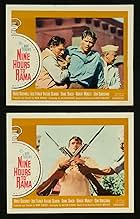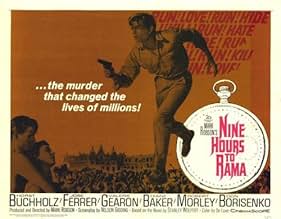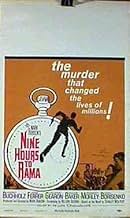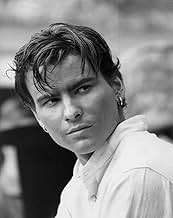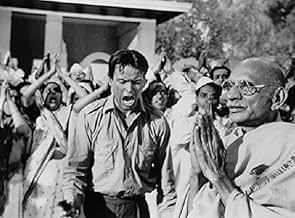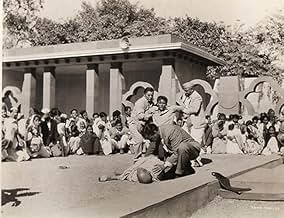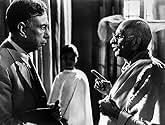NOTE IMDb
6,5/10
471
MA NOTE
Ajouter une intrigue dans votre langueFictional narrative of Hindu militant activist Nathuram Godse's plan to kill Mahatma Gandhi and of police officer Gopal Das' task to find the killer before it's too late.Fictional narrative of Hindu militant activist Nathuram Godse's plan to kill Mahatma Gandhi and of police officer Gopal Das' task to find the killer before it's too late.Fictional narrative of Hindu militant activist Nathuram Godse's plan to kill Mahatma Gandhi and of police officer Gopal Das' task to find the killer before it's too late.
- Réalisation
- Scénario
- Casting principal
- Nomination aux 1 BAFTA Award
- 1 nomination au total
Paidi Jairaj
- G.D. Birla
- (as Jairaj)
Achala Sachdev
- Mother
- (as Achla Sachdev)
Nagendra Nath
- Magin Mehta
- (as Narendra Nath)
Bobby R. Naidoo
- Retiring Room Manager
- (as Bobby Naidoo)
Avis à la une
So little is heard of this film these days, that it has almost slipped into obscurity. And that's a shame. It has a fascinating story at the core--but the drawback seems to be a series of flashbacks that could have been edited to omit too much emphasis on the love interest between the assassin (HORST BUCHHOLZ) and VALERIE GEARON.
The flashbacks explaining the youth of the future assassin are interesting enough and there's a lot of local color in the splendid Indian backgrounds to give the story an authentic feel. But the romance takes up too much time that cuts into the suspenseful angle of a tale that lacks the taut excitement generated by that other famous assassination attempt depicted in THE DAY OF THE JACKAL.
Jose Ferrer and Robert Morley are the only other notables in the cast, with the exception of DIANE BAKER (whom I almost didn't recognize as the dark-skinned Indian girl that shares an intense scene with Buchholz in which she gets slapped around pretty badly).
Two hours of running time is a bit of a stretch for this tale, which is still absorbing enough to watch under Mark Robson's forceful direction. HORST BUCHHOLZ carries the film with a very intense performance that gives the film almost all of its edge.
For an even more exemplary example of this type of film, I highly recommend THE DAY OF THE JACKAL for tighter suspense.
The flashbacks explaining the youth of the future assassin are interesting enough and there's a lot of local color in the splendid Indian backgrounds to give the story an authentic feel. But the romance takes up too much time that cuts into the suspenseful angle of a tale that lacks the taut excitement generated by that other famous assassination attempt depicted in THE DAY OF THE JACKAL.
Jose Ferrer and Robert Morley are the only other notables in the cast, with the exception of DIANE BAKER (whom I almost didn't recognize as the dark-skinned Indian girl that shares an intense scene with Buchholz in which she gets slapped around pretty badly).
Two hours of running time is a bit of a stretch for this tale, which is still absorbing enough to watch under Mark Robson's forceful direction. HORST BUCHHOLZ carries the film with a very intense performance that gives the film almost all of its edge.
For an even more exemplary example of this type of film, I highly recommend THE DAY OF THE JACKAL for tighter suspense.
Despite periodic attempts by his family to rehabilitate him, Natu Ram Ghodse remains **unperson** in India. It is illegal to publish his name or likeness, with the intention of wiping out all memory of the assassin of Mahatma Gandhi.
The astonishing portrayal of the magnicide Ghodse by young Horst Buchholz shows that it is possible on an emotional level to empathize with an unsympathetic character.
The casting probably is the best thing about this picture--that and the exceptional local color of the cinematography. Buchholtz was German born and bred, yet there always was something, well...Asiatic about his looks. Darken his complexion a bit and he makes a convincing Hindu. The most inspired casting of all however was J. S. Casshyap as Gandhi. Casshyap was a university professor, Indian but entirely at home in English, and this was his first film role. His last, too so far as is known. Seeing him bent over a simple spinning wheel really is like seeing the Great Soul himself on the last day of his life.
Many commenters have remarked the effective opening titles but none seem to get the significance of showing the steady unwinding of a watch's mainspring, with driving, rhythmic Indian music in the background. Time...time is passing...time is running out--for Mohandas Gandhi, for India, for the world.
The astonishing portrayal of the magnicide Ghodse by young Horst Buchholz shows that it is possible on an emotional level to empathize with an unsympathetic character.
The casting probably is the best thing about this picture--that and the exceptional local color of the cinematography. Buchholtz was German born and bred, yet there always was something, well...Asiatic about his looks. Darken his complexion a bit and he makes a convincing Hindu. The most inspired casting of all however was J. S. Casshyap as Gandhi. Casshyap was a university professor, Indian but entirely at home in English, and this was his first film role. His last, too so far as is known. Seeing him bent over a simple spinning wheel really is like seeing the Great Soul himself on the last day of his life.
Many commenters have remarked the effective opening titles but none seem to get the significance of showing the steady unwinding of a watch's mainspring, with driving, rhythmic Indian music in the background. Time...time is passing...time is running out--for Mohandas Gandhi, for India, for the world.
NINE HOURS TO RAMA distinguishes itself in the category of "historical fiction." While remaining faithful to Stanley Wolpert's novel, it perfectly captures the political tension of post-independence India which led to the murder of Mahatma Gandhi on 30 January 1948.
Nelson Gidding's screenplay eliminates some of the clutter of the novel, limits the flashbacks to the background of the assassin, Nathuram Godse, and maintains a good pace through the painful climax. Director Mark Robson (THE HARDER THEY FALL, VON RYAN'S EXPRESS), with the help of cinematographer Arthur Ibbetson, makes good use of the diverse landscape and people of India. Robson's international leads portray Indians with intelligence and sensitivity, blending expertly with many Indian supporting actors.
In making the transition from an exuberant 18-year old to an embittered fanatic of 30-plus, Horst Buchholz delivers an intense, focused performance as Godse, the real-life killer. Don Borisenko is his partner Apte, plagued by doubt and fear, and straining to reconcile his fateful mission with the tenets of his Hindu faith. The biggest liberty taken with history is the addition of a sophisticated, married woman with whom Godse falls in love, played by the lovely, elegant Valerie Gearon.
Jose Ferrer is superb as the Delhi police inspector desperately trying to prevent the inevitable, but hamstrung by the target himself. His frustration is shared by Harry Andrews, unrecognizable as a Sikh general. Robert Morley is fabulous as the parliamentarian whose hard-headed politics clashes with Gandhi's idealism. The gorgeous Diane Baker plays a prostitute who provides Godse with some much-needed refuge.
By far, the most inspired piece of casting is that of a former teacher, J. S. Casshyap, as Mahatma Gandhi. (Yes, HE is Indian!) His scenes, however brief, are the most startling. His resemblance to the great leader -- face, body, and voice -- is nothing short of remarkable, even more so than Ben Kingsley in the second half of GANDHI. It is one of the many injustices of the film world, that Casshyap was never even nominated for an Oscar for "Best Supporting Actor."
Robson and his crew deserve high praise for their fidelity to the subject matter and the professionalism of its execution, from Saul Bass's chilling opening credits (showing the inner workings of a stopwatch) and Malcolm Arnold's magnificent score, through the costume and production design, all the way to the brilliantly staged and edited assassination sequence. The result is one of the most underrated films of the 1960's.
I am furious that this is not available on VHS or DVD; in fact it should be in the widescreen format! One can only hope that 20th Century Fox will someday rectify the situation.
Nelson Gidding's screenplay eliminates some of the clutter of the novel, limits the flashbacks to the background of the assassin, Nathuram Godse, and maintains a good pace through the painful climax. Director Mark Robson (THE HARDER THEY FALL, VON RYAN'S EXPRESS), with the help of cinematographer Arthur Ibbetson, makes good use of the diverse landscape and people of India. Robson's international leads portray Indians with intelligence and sensitivity, blending expertly with many Indian supporting actors.
In making the transition from an exuberant 18-year old to an embittered fanatic of 30-plus, Horst Buchholz delivers an intense, focused performance as Godse, the real-life killer. Don Borisenko is his partner Apte, plagued by doubt and fear, and straining to reconcile his fateful mission with the tenets of his Hindu faith. The biggest liberty taken with history is the addition of a sophisticated, married woman with whom Godse falls in love, played by the lovely, elegant Valerie Gearon.
Jose Ferrer is superb as the Delhi police inspector desperately trying to prevent the inevitable, but hamstrung by the target himself. His frustration is shared by Harry Andrews, unrecognizable as a Sikh general. Robert Morley is fabulous as the parliamentarian whose hard-headed politics clashes with Gandhi's idealism. The gorgeous Diane Baker plays a prostitute who provides Godse with some much-needed refuge.
By far, the most inspired piece of casting is that of a former teacher, J. S. Casshyap, as Mahatma Gandhi. (Yes, HE is Indian!) His scenes, however brief, are the most startling. His resemblance to the great leader -- face, body, and voice -- is nothing short of remarkable, even more so than Ben Kingsley in the second half of GANDHI. It is one of the many injustices of the film world, that Casshyap was never even nominated for an Oscar for "Best Supporting Actor."
Robson and his crew deserve high praise for their fidelity to the subject matter and the professionalism of its execution, from Saul Bass's chilling opening credits (showing the inner workings of a stopwatch) and Malcolm Arnold's magnificent score, through the costume and production design, all the way to the brilliantly staged and edited assassination sequence. The result is one of the most underrated films of the 1960's.
I am furious that this is not available on VHS or DVD; in fact it should be in the widescreen format! One can only hope that 20th Century Fox will someday rectify the situation.
Though the work behind this film may have been admirable at the time and may have had good intentions, the result now is at best unspectacular and at worst insulting. Some intriguing titles by Saul Bass give way to a pretty pedestrian film. The story is torturously told...featuring the dreaded flashback approach and a gallery of clichéd characters and situations. The cast is a befuddling mixture of British, German, Puerto Rican, American and who knows what all else all shuffling around in dark contact lenses and "brownface" as they attempt to portray Indian people. They all adapt that hokey sing-song method of speaking which is an exaggerated and stereotypical version of how Indians relay the English language. It's worst sin is it's DULLNESS! From the man who would direct "Valley of the Dolls" and "Earthquake", one might have expected a touch more pizazz! The climactic assassination attempt is pretty tense and well handled, but getting there is no picnic.
A film which builds up to a climax is spoilt by some unconvincing performances, especially Harry Andrews' Indian Officer and Robert Morley. Despite this, the direction is reasonable and the film worth seeing as there seem so few films about this subject.
Le saviez-vous
- AnecdotesAccording to Richard Attenborough, this film was one of the major reasons why his Gandhi had major problems with the Indian Government for many years.
- GaffesWhen Horst is walking in Delhi from his room towards the house where Gandhi was staying, he looks idly over a wall by the road. The camera looks over, and there is a mass of people doing laundry. It's the famous Dhobi Ghat in Bombay, 700 miles from Delhi.
- ConnexionsEdited into Bass on Titles (1982)
Meilleurs choix
Connectez-vous pour évaluer et suivre la liste de favoris afin de recevoir des recommandations personnalisées
- How long is Nine Hours to Rama?Alimenté par Alexa
Détails
Box-office
- Budget
- 3 610 000 $US (estimé)
- Durée
- 2h 4min(124 min)
- Couleur
- Rapport de forme
- 2.35 : 1
Contribuer à cette page
Suggérer une modification ou ajouter du contenu manquant

